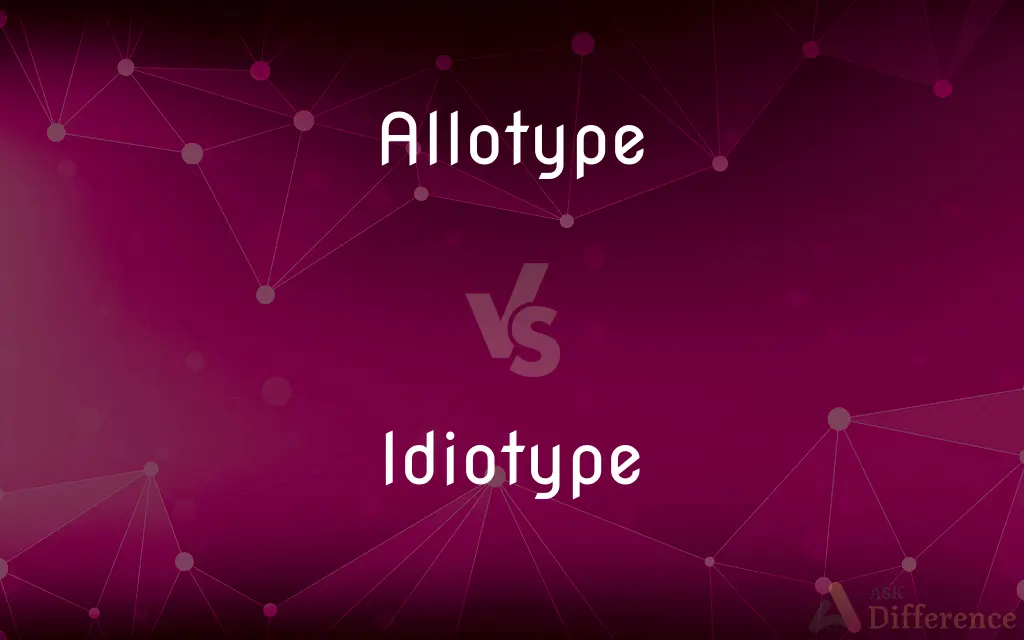Allotype vs. Idiotype — What's the Difference?
By Maham Liaqat & Fiza Rafique — Published on February 18, 2024
Allotype refers to genetic variations in the constant region of antibodies, differing among individuals of the same species. Idiotype involves unique antigen-binding sites of antibodies, specific to each antibody molecule.

Difference Between Allotype and Idiotype
Table of Contents
ADVERTISEMENT
Key Differences
Allotype and idiotype are terms related to the immunoglobulin (antibody) molecules produced by the immune system. Allotypes are determined by genetic variations in the constant (Fc) region of the antibody molecule, which do not affect the antibody's specificity but can vary between individuals within a species. These genetic differences lead to the production of slightly different versions of antibodies, which can be recognized by specific allotypic markers. For example, one person's IgG antibodies might have slightly different allotypic markers compared to another's, due to differences in their genetic makeup.
Idiotypes, on the other hand, are determined by the unique structure of the variable (antigen-binding) region of an antibody molecule. This region is responsible for the antibody's specificity to bind to a particular antigen. The idiotype includes the unique set of antigenic determinants of the variable region that can trigger an immune response. Each antibody has its own idiotype, making it unique and enabling the immune system to produce a vast array of antibodies, each capable of targeting a specific antigen.
While allotypes are useful for understanding genetic variations in antibody populations among individuals and can have implications for transfusions and transplantation due to immune recognition, idiotypes are central to the specificity and diversity of the immune response. Idiotypes can be targeted in vaccine development and cancer therapy to stimulate an immune response against specific antigens.
The study of allotypes and idiotypes is important in immunology for characterizing antibody populations and understanding individual immune responses. Differences in allotypes can lead to compatibility issues in blood transfusions and organ transplants, whereas understanding idiotypes is crucial for developing targeted immunotherapies and vaccines.
In summary, allotypes refer to variations among individuals that do not affect antibody specificity, while idiotypes are unique to each antibody, determining its specific antigen recognition. Both concepts are crucial for the study of immunology and the development of therapeutic interventions.
ADVERTISEMENT
Comparison Chart
Definition
Genetic variation in the antibody's constant region
Unique antigen-binding site of an antibody
Variation
Among individuals of the same species
Unique to each antibody molecule
Impact
Does not affect antigen specificity
Determines antigen specificity
Importance
In transfusions and transplantation
In vaccine development and immunotherapy
Detection
Through specific allotypic markers
Through unique idiotype-specific antibodies
Compare with Definitions
Allotype
Identified by specific markers.
Researchers detected the allotype using allotype-specific assays.
Idiotype
Idiotype describes the unique antigen-binding sites of antibodies.
The idiotype of this antibody perfectly matches the viral antigen.
Allotype
Allotypes are inherited and vary among individuals.
Blood relatives might share similar allotypes.
Idiotype
Specific to each antibody molecule.
Each monoclonal antibody has a distinct idiotype.
Allotype
Important for understanding immune compatibility.
Allotype mismatches can complicate organ transplantation.
Idiotype
Central to antibody specificity and diversity.
The idiotype diversity allows for a wide range of antigen recognition.
Allotype
Allotype refers to genetic variations in antibodies' constant regions.
The allotype of her IgG differs from the common variant.
Idiotype
Can induce an immune response against itself.
Idiotypic variation can trigger autoantibody production in some cases.
Allotype
Does not influence antibody specificity.
Despite different allotypes, the antibodies bind the same antigen.
Idiotype
Targeted in specific immunotherapies.
Idiotype vaccines are designed to target cancer cells.
Allotype
(Immunology) Any of several variants in the constant region of a given class or subclass of immunoglobulins that are caused by allelic variation and differ from individual to individual.
Idiotype
The complete set of idiotopes contained within the variable region of a particular immunoglobulin molecule and making up the molecule's antigen binding site.
Allotype
(biochemistry) A genetically determined variant of the amino acid sequence of a protein.
Idiotype
(immunology) A characteristic shared by a group of immunoglobulin or T-cell receptor molecules, based on the antigen-binding specificity of their variable region; and thus, the resultant immunologic phenotype, which can often be specific to a person or to only a small percentage of people.
Allotype
(immunology) An immunoglobulin allotype; the allele of the antibody chains found in an individual.
Common Curiosities
What role do idiotypes play in vaccine development?
They are targeted to create vaccines that stimulate an immune response against specific antigens.
Are allotypes present in all antibodies?
All antibodies have an allotype, but it varies among individuals.
How is idiotype specificity achieved?
Through unique configurations of the variable region that binds to specific antigens.
Can an individual have multiple allotypes?
Yes, individuals can have multiple allotypes across different antibody classes.
Do all idiotypes trigger an immune response?
Idiotypes can trigger an immune response, especially in the context of autoimmunity or vaccination.
How do allotypes and idiotypes contribute to immune diversity?
Allotypes contribute to genetic diversity among individuals, while idiotypes provide specificity and diversity within an individual's antibody repertoire.
How do researchers study allotypes and idiotypes?
Through molecular and immunological techniques that identify specific markers and binding sites.
Can allotypes lead to autoimmune diseases?
Not directly; allotypes are more related to immune recognition among individuals.
What determines an antibody's allotype?
Genetic variations in the constant region of the antibody molecule.
Can allotypes affect blood transfusions?
Yes, differences in allotypes can lead to immune reactions in transfusions.
How are idiotypes identified?
Through the use of idiotype-specific antibodies in laboratory assays.
What's the significance of allotypes in organ transplantation?
Matching allotypes can reduce the risk of transplant rejection.
Are idiotype vaccines widely used?
Idiotype vaccines are an area of research, particularly in cancer immunotherapy.
How do allotypes and idiotypes affect therapeutic antibody development?
Understanding them is crucial for designing antibodies with desired specificities and minimizing immune responses against therapeutic antibodies.
Can changes in idiotype affect antibody function?
Yes, changes in idiotype can alter antigen-binding specificity and efficacy.
Share Your Discovery

Previous Comparison
Google vs. Wolfram Alpha
Next Comparison
Berries vs. CherriesAuthor Spotlight
Written by
Maham LiaqatCo-written by
Fiza RafiqueFiza Rafique is a skilled content writer at AskDifference.com, where she meticulously refines and enhances written pieces. Drawing from her vast editorial expertise, Fiza ensures clarity, accuracy, and precision in every article. Passionate about language, she continually seeks to elevate the quality of content for readers worldwide.














































